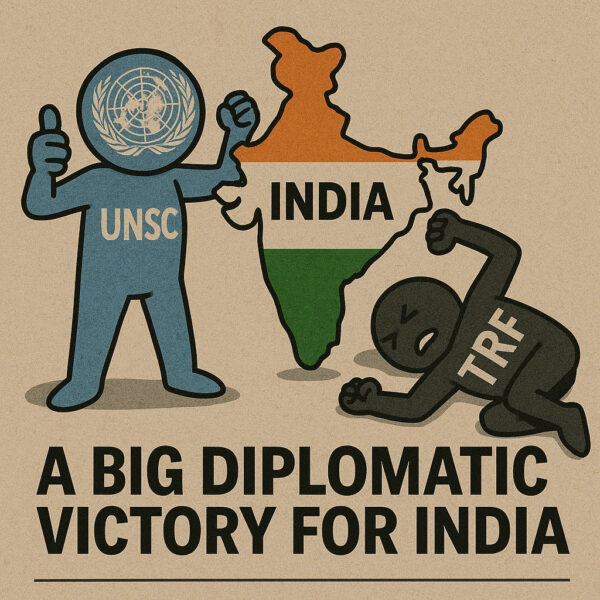 India has achieved a significant diplomatic breakthrough. For the first time, a United Nations Security Council report has openly named The Resistance Front (TRF), a front of Lashkar-e-Taiba, as the group responsible for the Pahalgam terror attack in Jammu and Kashmir. This direct acknowledgment by the UN is rare and shows how India’s sustained diplomatic efforts are finally bearing fruit. The report not only identified the group but also noted how TRF claimed responsibility for the attack twice, circulated a photo of the site, and used encrypted platforms to threaten further violence. This level of clarity marks a shift in global perception. The world is now more willing to accept and act on what India has been saying for decades—that Pakistan continues to support and shelter terrorist networks.
India has achieved a significant diplomatic breakthrough. For the first time, a United Nations Security Council report has openly named The Resistance Front (TRF), a front of Lashkar-e-Taiba, as the group responsible for the Pahalgam terror attack in Jammu and Kashmir. This direct acknowledgment by the UN is rare and shows how India’s sustained diplomatic efforts are finally bearing fruit. The report not only identified the group but also noted how TRF claimed responsibility for the attack twice, circulated a photo of the site, and used encrypted platforms to threaten further violence. This level of clarity marks a shift in global perception. The world is now more willing to accept and act on what India has been saying for decades—that Pakistan continues to support and shelter terrorist networks.
This diplomatic success was not achieved in a vacuum. It was built on the back of strong, strategic military actions, most notably Operation Sindoor and Operation Mahadev. Operation Sindoor, launched earlier this year, was a precise and limited strike on terror hideouts located inside Pakistan’s territory. What set it apart was the clean execution—specific targets were hit, all linked to terror, with zero civilian casualties. But what truly shocked the world was what came after. Pakistani army officers were seen participating in the funerals of the terrorists India had eliminated in the strike. This was captured through satellite and intelligence imagery and left no doubt about the Pakistani army’s direct links to these groups.
As External Affairs Minister S. Jaishankar pointed out, only three out of 190 UN member states formally opposed Operation Sindoor. The rest either supported India or chose to remain neutral—something that would have been unthinkable just a few years ago. This is clear proof that the global mood is shifting. More and more countries now view terrorism as a global threat and recognize India’s right to defend itself.
Soon after Operation Sindoor, India launched Operation Mahadev. Unlike Sindoor, which was an external strike, Mahadev was an internal, intelligence-based operation in which Indian forces swiftly eliminated all the terrorists responsible for the Pahalgam attack. This showed that India was not content with just sending a message—it was determined to neutralize every threat, both inside and outside its borders. The contrast is clear: Operation Sindoor exposed and struck Pakistan-based terror infrastructure, while Operation Mahadev ensured justice was delivered swiftly within India.
Together, these two operations sent a loud and clear message to the world—India will not tolerate cross-border terrorism and will respond with precision and purpose. Another symbolic moment came when senior Indian army officers were seen at the cremation sites of the terrorists in Pakistan, again captured via satellite intelligence. This marked a psychological victory. The Pakistani army, which covertly supported these individuals, had no choice but to attend their funerals. India, through its actions, made them face the consequences of their own duplicity.
Adding to this assertive strategy, India also decided to put the Indus Waters Treaty in abeyance—a treaty it has respected since 1960. This move was a calculated diplomatic signal that there can be no business as usual with a country that continues to export terror. It was yet another masterstroke that reinforced India’s tough new posture on Pakistan-sponsored terrorism.
All these steps—international diplomatic wins, surgical military operations, and strategic policy moves—are shaping a new Indian doctrine. But the ultimate success will come when the world publicly accepts what is already obvious—that the Pakistan army is not just complicit but central to the existence and operations of groups like Lashkar-e-Taiba, Jaish-e-Mohammed, and TRF. Until that day, every small shift in global opinion, every statement like the one in the latest UNSC report, is a step in the right direction.
India has shown that condemnation alone is not enough. It has backed its words with action, and the world is beginning to respond.